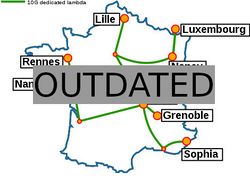Grid5000:Home
|
Grid'5000 is a large-scale and versatile testbed for experiment-driven research in all areas of computer science, with a focus on parallel and distributed computing including Cloud, HPC and Big Data. Key features:
Older documents:
|
Random pick of publications
Five random publications that benefited from Grid'5000 (at least 2937 overall):
- Georges da Costa. Hardware and application aware performance, power and energy models for modern HPC servers with DVFS. Sustainable Computing : Informatics and Systems, 2025, 46, pp.101106. 10.1016/j.suscom.2025.101106. hal-04983485 view on HAL pdf
- Hee-Soo Choi, Priyansh Trivedi, Mathieu Constant, Karën Fort, Bruno Guillaume. Au-delà de la performance des modèles : la prédiction de liens peut-elle enrichir des graphes lexico-sémantiques du français ?. Actes de JEP-TALN-RECITAL 2024. 31ème Conférence sur le Traitement Automatique des Langues Naturelles, volume 1 : articles longs et prises de position, Jul 2024, Toulouse, France. pp.36-49. hal-04623008 view on HAL pdf
- François Portier, Lionel Truquet, Ikko Yamane. Nearest Neighbor Sampling for Covariate Shift Adaptation. 2024. hal-04645530 view on HAL pdf
- Mai Huong Do, Millian Poquet, Georges da Costa. FedE-ator : A framework for energy consumption analysis of federated learning in distributed systems. Compas’2025 : Parallélisme / Architecture/ Système, Jul 2025, Bordeaux, France. hal-05181877 view on HAL pdf
- Yarin Oziel, Tomer Laor, Shlomi Levy, Clémentine Maurice, Yossi Oren, et al.. WIP: A Second Look at Port Assignment on Intel CPUs. uASC 2026 - 2nd Microarchitecture Security Conference, Feb 2026, Leuven, Belgium. hal-05337434 view on HAL pdf
Latest news
Failed to load RSS feed from https://www.grid5000.fr/mediawiki/index.php?title=News&action=feed&feed=atom: Error parsing XML for RSS
Grid'5000 sites
Current funding
As from June 2008, Inria is the main contributor to Grid'5000 funding.
INRIA |
CNRS |
UniversitiesUniversité Grenoble Alpes, Grenoble INP |
Regional councilsAquitaine |


